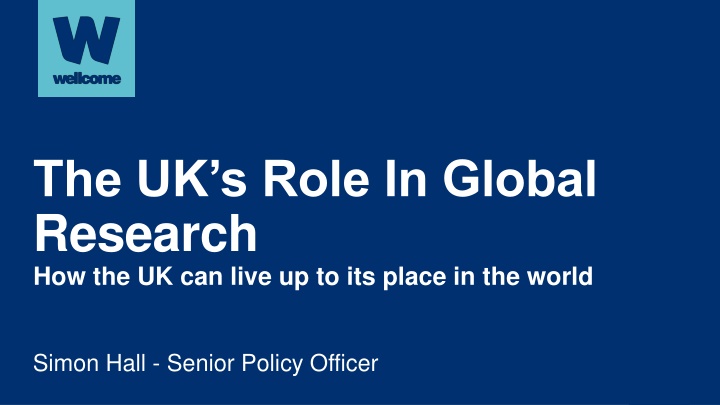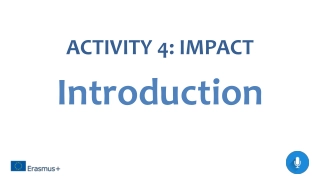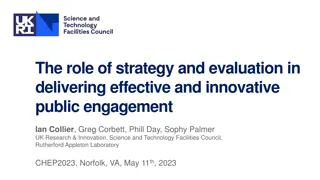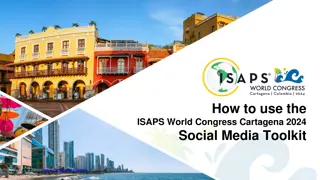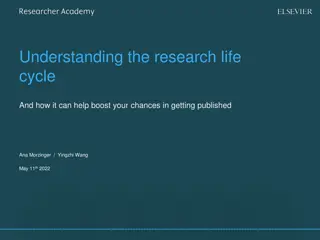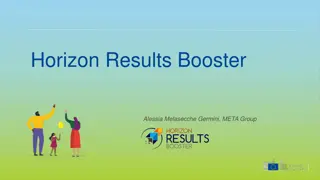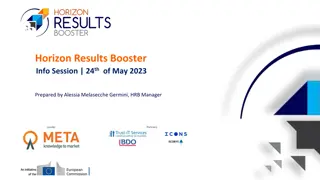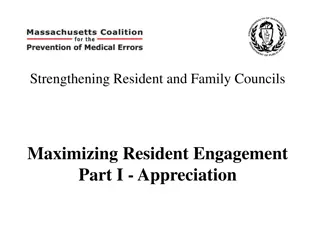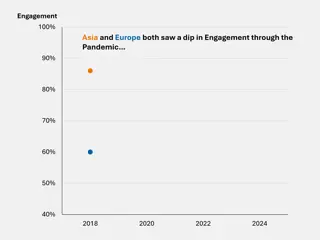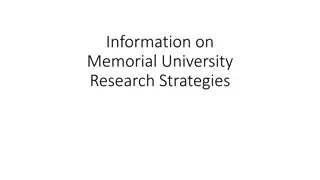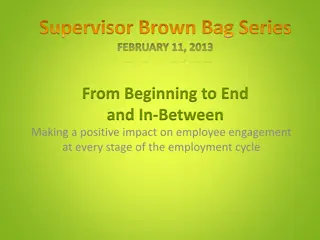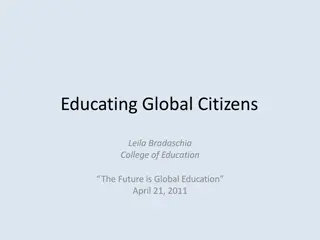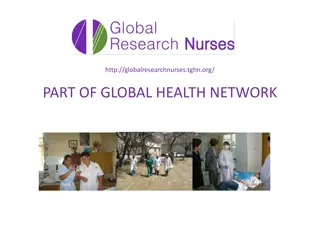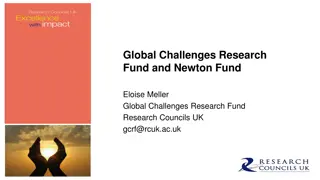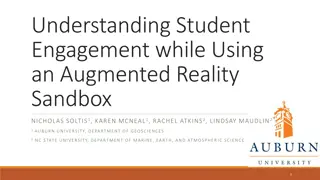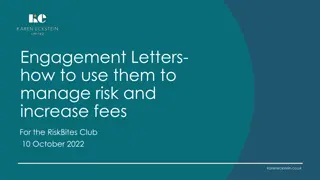The UK's Role in Global Research: Maximizing Impact and Engagement
Explore how the UK can fulfill its global research potential through strategic partnerships, innovative policies, and international collaboration. The report outlines key areas essential for the UK to uphold its esteemed position in the global research landscape, emphasizing the importance of a clear vision, strong partnerships, and a commitment to addressing global challenges.
Download Presentation

Please find below an Image/Link to download the presentation.
The content on the website is provided AS IS for your information and personal use only. It may not be sold, licensed, or shared on other websites without obtaining consent from the author.If you encounter any issues during the download, it is possible that the publisher has removed the file from their server.
You are allowed to download the files provided on this website for personal or commercial use, subject to the condition that they are used lawfully. All files are the property of their respective owners.
The content on the website is provided AS IS for your information and personal use only. It may not be sold, licensed, or shared on other websites without obtaining consent from the author.
E N D
Presentation Transcript
The UKs Role In Global Research How the UK can live up to its place in the world Simon Hall - Senior Policy Officer
What I will cover . 1. Why 2. How 3. The Report 4. Key areas connected to ODA
How Dr Jean Arlat, Counsellor for Science and Technology, Higher Education, Research and Innovation, French Embassy in London Professor Michele Barry, Director, Centre for Innovation in Global Health, Stanford University School of Medicine Professor Philip Bejon, Director, KEMRI-Wellcome Trust Research Programme, Kenya Professor Brian Bell, Chair, Migration Advisory Committee and Professor of Economics, King's College London Dr Zulfiqar A. Bhutta, Co-Director, Centre for Global Child Health, The Hospital for Sick Children, Toronto Professor Sir Ian Boyd, Professor in Biology, University of St Andrews and former Chief Scientific Adviser, Department of Environment, Food and Rural Affairs (2012 19) Professor Paul Boyle, Vice-Chancellor, Swansea University Professor Jean-Pierre Bourguignon, President, European Research Council Professor Agnes Binagwaho, Vice-Chancellor and co-founder, University of Global Health Equity, Rwanda, and Senior Advisor to the Director General, WHO Professor Julia Buckingham CBE, President, Universities UK and Vice-Chancellor, Brunel University, London Professor Bernard Charpentier, Chair, Science Advice, Policy by European Academies (SAPEA), and President, Federation of European Academies of Medicine (FEAM) Professor Kurt Deketelaere, President, League of European Research Universities Professor David Dockrell, Chair of Infection Medicine, Centre for Inflammation Research, Edinburgh Medical School Professor Hazel Dockrell, Professor of Immunology, and Special Advisor to the Director on Overseas Programmes, London School of Hygiene and Tropical Medicine Dr Robert Eiss, Senior Global Health Adviser, Fogarty International Centre, National Institutes of Health
The Report - 4 Prerequisites 4 Principles 24 recommendations These principles should inform a new long-term vision for UK research, direct the approach to international research policy, and act as a guiding light for the imminent choices facing the Government.
Prerequisites Secure the UK s domestic research environment Commission an international equivalent of the R&D Roadmap providing a North Star for government decision making Craft a clear engaging narrative for the UK s approach to international research Continue to be an internationally engaged country committed to solving global, as well as national, problems.
Narrative Create an engaging narrative for the UK s research ambitions that resonates with the community who are needed to deliver it Continue to be an internationally engaged country committed to solving global, as well as national, problems Since Brexit, the perception of the UK has changed for many international partners and there is a lot more uncertainty about what it will be like to work with the UK. Scientists are now needing to spend time reassuring and convincing our potential scientific partners around the world that the UK is still worth working with. It sends the wrong message. You have your science partners and collaborators in other parts of the world they are good enough to work with you, they are good enough to be your scientific partner but they are not good enough to set foot on your soil or come for a visit. The biggest danger we have in recruitment at the moment is that we are seen to be unfriendly Anonymous participant Dr Zulfiqar A. Bhutta, Co-Director, Centre for Global Child Health, The Hospital for Sick Children, Toronto Professor Chris Petkov, Laboratory of Comparative Neuropsychology, Newcastle University
Principles. 1. The UK must be open openness underpins scientific progress, encouraging the interaction of people and ideas which leads to new solutions. 2. The UK must build networks around the world International research collaboration is now essential to deliver world-leading science 3. The UK must be strategic As a medium-sized nation, the UK will need to deploy its resources strategically and efficiently to maximise its impact 4. The UK must use its influence for global good - The UK must use it scientific reputation to take on a true leadership role in tackling global challenges, combining research expertise with political and diplomatic knowhow.
The UK must choose international partners strategically Building relationships around shared principles, drawn up as equal partners Investing long term, supporting research for decades, instead of years. Helping shift the centre of gravity One of the problems the UK has is that it has these funding ideas, it sets them up, and even if they are successful it doesn t follow through with long term funding. It is really really frustrating. The money is only there for 3 5 years and then it s gone. It s not strategic and it is not a strategic investment in those countries. In Rwanda, we have some great partnerships and have done some significant research. However the majority of UK funds we directly compete for do not concern subjects that match the needs of our country. I am writing a research application for a programme with a UK university based on UK priorities because that is where the money is. I would love to put my energy into equally exciting research that will also help to build my country . The Global South may not have the strongest research systems in the world, but we do have a competitive advantage in some areas Dr Qhobela, Chief Executive Officer of the National Research Foundation of South Africa Professor Agnes Binagwaho, Vice Chancellor and co-founder, University of Global Health Equity, Rwanda Professor Sir Ian Boyd, Professor in Biology, University of St Andrews Actions
The UK must use its influence for global good Progress from world-leading to global leadership Maximise diplomatic and informal influence Part of being a global leader in research is having the courage to lead into new places, to take on challenges that to others might seem insurmountable. We are very much welcome at the table because of our willingness to be collaborative. Professor Pamela Kearns, Director, Institute of Cancer and Genomic Sciences, University of Birmingham Amanda Solloway MP, Minister for Science, Research and Innovation (Vitae Connections speech, September 2020)
Questions? S.Hall@wellcome.org or happy to chat on Teams!
